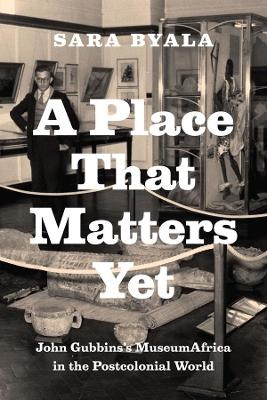
A Place That Matters Yet
John Gubbins's MuseumAfrica in the Postcolonial World
Seiten
2013
University of Chicago Press (Verlag)
978-0-226-03030-2 (ISBN)
University of Chicago Press (Verlag)
978-0-226-03030-2 (ISBN)
Tells the story of Johannesburg's MuseumAfrica, a South African history museum that embodies one of the most dynamic and fraught stories of colonialism and postcolonialism, its life spanning the eras before, during, and after apartheid. This title focuses on racism and its institutionalization in South Africa.
"A Place That Matters Yet" unearths the little-known story of Johannesburg's MuseumAfrica, a South African history museum that embodies one of the most dynamic and fraught stories of colonialism and postcolonialism, its life spanning the eras before, during, and after apartheid. Sara Byala, in examining this story, sheds new light not only on racism and its institutionalization in South Africa but also on the problems facing any museum that is charged with navigating colonial history from a postcolonial perspective. Drawing on thirty years of personal letters and public writings by museum founder John Gubbins, Byala paints a picture of a uniquely progressive colonist, focusing on his philosophical notion of "three-dimensional thinking," which aimed to transcend binaries and thus - quite explicitly - racism. Unfortunately, Gubbins died within weeks of the museum's opening, and his hopes would go unrealized as the museum fell in line with emergent apartheid politics.
Following the museum through this transformation and on to its 1994 reconfiguration as a postapartheid institution, Byala showcases it as a rich - and problematic - archive of both material culture and the ideas that surround that culture, arguing for its continued importance in the establishment of a unified South Africa.
"A Place That Matters Yet" unearths the little-known story of Johannesburg's MuseumAfrica, a South African history museum that embodies one of the most dynamic and fraught stories of colonialism and postcolonialism, its life spanning the eras before, during, and after apartheid. Sara Byala, in examining this story, sheds new light not only on racism and its institutionalization in South Africa but also on the problems facing any museum that is charged with navigating colonial history from a postcolonial perspective. Drawing on thirty years of personal letters and public writings by museum founder John Gubbins, Byala paints a picture of a uniquely progressive colonist, focusing on his philosophical notion of "three-dimensional thinking," which aimed to transcend binaries and thus - quite explicitly - racism. Unfortunately, Gubbins died within weeks of the museum's opening, and his hopes would go unrealized as the museum fell in line with emergent apartheid politics.
Following the museum through this transformation and on to its 1994 reconfiguration as a postapartheid institution, Byala showcases it as a rich - and problematic - archive of both material culture and the ideas that surround that culture, arguing for its continued importance in the establishment of a unified South Africa.
Sara Byala is a historian and senior writing fellow in the Center for Programs in Contemporary Writing at the University of Pennsylvania.
| Erscheint lt. Verlag | 7.6.2013 |
|---|---|
| Sprache | englisch |
| Maße | 15 x 23 mm |
| Gewicht | 510 g |
| Themenwelt | Kunst / Musik / Theater |
| Geisteswissenschaften ► Geschichte ► Hilfswissenschaften | |
| Geisteswissenschaften ► Geschichte ► Regional- / Ländergeschichte | |
| Geschichte ► Teilgebiete der Geschichte ► Wirtschaftsgeschichte | |
| Sozialwissenschaften ► Soziologie | |
| ISBN-10 | 0-226-03030-X / 022603030X |
| ISBN-13 | 978-0-226-03030-2 / 9780226030302 |
| Zustand | Neuware |
| Haben Sie eine Frage zum Produkt? |
Mehr entdecken
aus dem Bereich
aus dem Bereich


